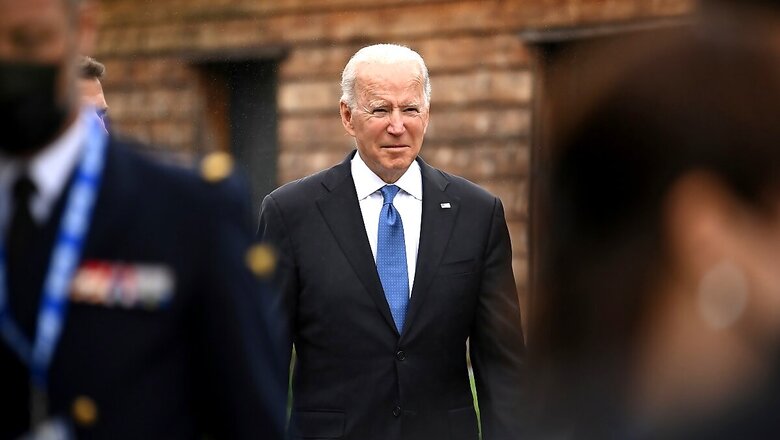
views
“Lofty words cannot construct an alliance or maintain it; only concrete deeds can do that.”
–John F. Kennedy
Albert Einstein perfectly summed up political risk thinking when he said, “Everything should be made as simple as possible, but not simpler.” The best analysts understand that there is an absolute need to explain a planet of infinite complexities in accurate, relatable terms that captures the essence of what is going on. However, there is an accompanying great danger that the drive toward elegant simplicity intellectually morphs into a shallow caricature of the world that fundamentally misleads.
At last week’s G7 meeting in Cornwall, US President Joe Biden’s theory of the world was found wanting, proving to be an oversimplification of a very complicated place. Faced with a new era with two discernible superpowers (the US and China), the new President is rightly aware that the key to ultimate success in this bipolar competition is which superpower crafts genuine alliances with the great powers just below it, in order of importance (the Anglosphere countries, the EU, Japan, India, and Russia).
Biden, correctly condemning the outgoing Trump administration for not doing enough to curry favour with these great powers—which, unlike during the US-Soviet Cold War, now have a great deal of latitude in setting the trajectories of their respective foreign policies—sees a geostrategic opening here based on ideology. He correctly points out that the great democratic powers are all more pro-American than they are pro-Chinese, while Russia is closer to China. This, Biden is certain, is the basic new strategic division in the world.
ALSO READ | G7 Cannot Address Global Issues on Its Own. To Counter China’s Disruptive Ambition, World Needs Quad
It is here that Biden’s worldview slips from simple to simplistic. Of course, Biden hopes that this democracy versus autocracy theme has intellectual legs (fawning US commentators have even labelled the new idea ‘the Biden Doctrine’), as it suits America’s geostrategic position. With the Anglosphere, India, Japan, and the EU all firmly on the US’ side (with only economically sclerotic Russia supporting China), America is likely to retain its pre-eminent global role into the new era.
The G7 meeting served as perfect experimental template for Biden’s thesis, as its membership comprises most of the other great powers in question: The EU (Germany, France, and Italy), Japan, and the Anglosphere countries (UK, Canada). Surely, all these democratic allies would easily coalesce around a common position balancing China?
Of course, they did not. Beyond the abundant flummery of the G7 meeting—by far, its most important initiative, the plan for putting a common floor on global taxation of multinationals (Amazon, Google, Facebook), was worked out well in advance of the photo ops in Cornwall—almost nothing of substance was agreed about how to commonly deal with China, which is by far the single most important foreign policy challenge faced by the democratic grouping.
The G7 countries did agree to yet another World Health Organisation (WHO) investigation into the causes of the pandemic. However, given the WHO’s appalling recent track record over this issue, the world needn’t wait with bated breath. Neutralist EU leaders Germany and Italy (plus the EU Commission President, Ursula von der Leyen, and EU Council President, Charles Michel)—seeing China as much as a market opportunity as an existential geopolitical threat—blocked the US, the Anglosphere countries (UK, Canada), and France from their efforts to name and shame Beijing’s horrendous forced labour practices against the Uighurs in western Xinjiang province.
Pathetically, an earlier specific reference to these human rights violations was omitted in the final draft, with only a pallid, generic reference to the global evils of forced labour included. Tellingly, such was the state of G7 disunity over Beijing that China itself was not mentioned in the group’s final communique, despite it having emerged as the dominant topic of the leaders’ discussions.
ALSO READ | Proof of the Pudding is in the Eating: Why Putin-Biden Geneva Summit is a Success
The real-world G7 diplomatic failure stands as an intellectual rebuke to Biden’s putative doctrine. This is because, in his over-simplification of the world, the Wilsonian President has assumed that just because the democratic states have similar values, they are bound to have similar interests. The ineffectual G7 meeting showed this to be a gross over-simplification. At present, as the meeting attests to, Japan, India, and the Anglosphere countries are lining up firmly in the American camp on the need to balance against China. However, both Russia (though certainly tilting towards Beijing) and the EU (tilting towards Washington) are instead struggling to maintain more of a neutralist stance independent of either superpower.
The Kremlin, fearful of its subordinate position in any Sino-Russian alliance, with a regime founded on the principle of the Great Russian nationalism, is wary of being swallowed whole by the Chinese whale. The EU, chafing for decades under US domination and beguiled by the perceived riches of the Chinese market, is tempted to not fully commit to the American camp.
Leaving out the complexity that the great powers today can pursue independent neutralism as well as align with either superpower led Biden to naively believe all the democratic great powers would be with him; the G7 decisively proved otherwise. To emerge victorious in the great Sino-American competition, such intellectual oversimplifications must be avoided at all costs. Otherwise, expect an endless series of G7 meetings amounting to nothing.
This article was first published on ORF.
Read all the Latest News, Breaking News and Coronavirus News here.




















Comments
0 comment